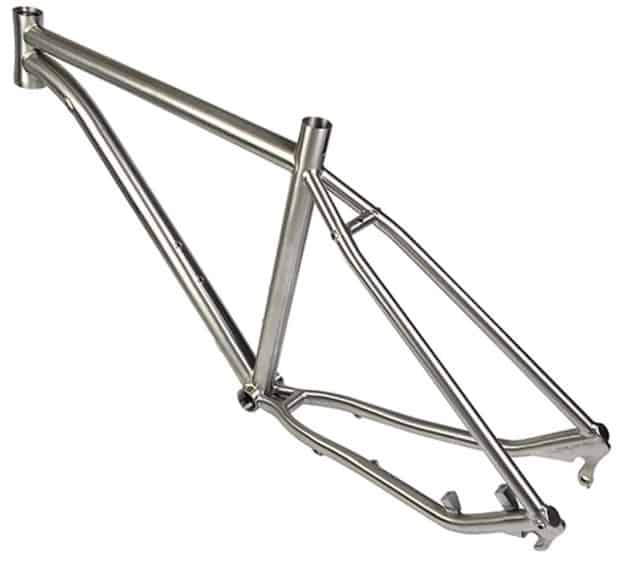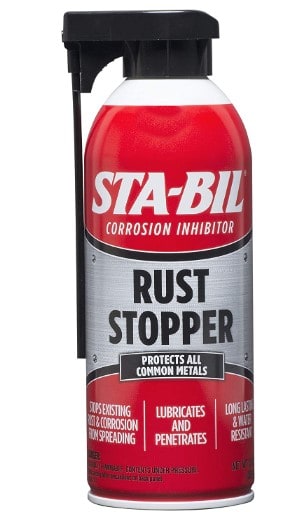Titanium frames may be costlier than most, but they are among the strongest and most-rust-resistant bike frames on the market. So, they are expected to last longer. But how long do titanium bike frames last?
Titanium frames last about 10-15 years due to the material’s higher tensile strength, stiffness, and fatigue resistance. With good maintenance, however, a high-grade titanium frame can last 20-40 years.
But is titanium a good bike frame for you? What advantages does it enjoy over the likes of steel, carbon, and aluminum? More importantly, why does the bike frame have such a long shelf life?
Let’s start with the last part.

How Long Do Titanium Bike Frames Last?
High-grade titanium matches low-grade steel in a strength-to-weight ratio.
Pure titanium typically has a 434mpa (or 3,000psi) tensile strength, which equals low-grade steel but is less dense, thus lighter. So, its advantage over steel is that it’s lighter in weight.
Titanium’s high tensile strength enables it to tolerate more weight and not to fatigue quickly. For that reason, titanium is an excellent choice for heavy guys, more so those who ride aggressively.
The other quality is that titanium is rust-resistant. Its titanium dioxide natural coating enables it to withstand corrosion. So, unlike steel which could rust due to contact with moisture, titanium doesn’t rust.
All these reasons explain why titanium has a 10-15 years average lifespan, with some hitting 20-40 years. Steel, in contrast, has a 6-10 years lifespan.
The other thing that gives titanium a longer shelf life is its ability to withstand the damaging effects of extreme temperature.
Titanium resists both heat and cold temperatures, thus an excellent choice in all weather, unlike carbon fiber, which degrades from prolonged sun exposure, or steel, which yields to the effects of humidity.
Is Titanium Good For Bike Frames?
I’ve already mentioned the following advantages of titanium:
- High-tensile strength (strength to weight ratio)
- Corrosion-resistance
- Resistance against extreme weather
But is that all? Of course not!
While those properties are sufficient to convince you to get a titanium frame, here are more:
- Titanium is easily customizable – Like steel, titanium is easy to shape and weld, making it a good choice for custom bike building.
- Titanium has bump-absorbing properties – Titanium swallows up excess bumps, making it an excellent choice for aggressive riding, more so off-road.
- It’s polished – You don’t have to worry about titanium losing its luster, as you can restore it by polishing the frame. Using a metal polish like the Chemical Guys SPI-402-16, you can have titanium’s soft glow back. It gets rid of stains and all kinds of coats from the frame.

So, Which Way Titanium?
Titanium’s high-tensile strength coupled with bump-dampening potential makes it perfect for high-performance bikes.
Its low weight and stiffness give it easy climbing and sprinting advantages, making it particularly suitable for high-end race bikes.
On the other hand, its impact resistance means it can soak up bumps and tolerate off-road abuse, unlike other frame materials.
What’s more, its fatigue resistance enables it to tolerate regular use.
Its major downside is its price. Titanium doesn’t come cheap. You may have to spend more than $1,200 on a titanium frame alone, making it one of the costliest frame options on the market.
Other shortfalls of the metal include:
- Titanium is heavier than aluminum and carbon
- It can crack over time if it absorbs welding gas, especially argon, or comes into contact with high-heat chlorides
Titanium Bike Frames Vs. Its Competitors
1. Titanium vs. Steel Bike Frames
Here’s how steel and titanium compare:
- Strength – Both materials are stronger, but high-grade steel has more tensile strength than high-grade titanium.
- Weight – Titanium is less dense than steel, and that makes it slightly lighter.
- Comfort – Both steel and titanium absorb considerable vibrations to offer you good comfort.
- Cost – High-quality titanium costs more than high-grade steel.
- Rust – Steel can rust when it comes into contact with moisture and air. That’s unless you paint it or spray it with a rust-inhibition spray like the STA-BIL (22003) Rust Stopper (View on Amazon).

2. Titanium vs. Carbon Bike Frames
Here’s how titanium and carbon compare:
- Frame fit – Titanium can be welded and customized to whatever frame size. As a result, it’s easier to find your fit. Carbon, in contrast, is not as customizable as titanium. So, the chances of a frame not fitting are much higher.
- Comfort – Both carbon and titanium effectively dampen vibrations, which means they promise a much comfortable ride.
- Strength – Both titanium and carbon are stronger. However, carbon can snap when stressed by too much weight or clamping.
- Weight – Carbon is lighter than titanium, thus an excellent choice for racing and mountain biking.
- Weather resistance – Both materials don’t rust. Carbon, however, degrades from prolonged sun exposure.
3. Titanium vs. Aluminum Bike Frames
Now, here’s how titanium and aluminum compare:
- Strength – Titanium enjoys more high-tensile strength and fatigue resistance. So, unlike aluminum, titanium won’t bend. Aluminum is brittle and will therefore break or warp due to too much stress.
- Stiffness – Titanium equals steel in stiffness but stiffer than aluminum. So, it enjoys more endurance, making it best for racing.
- Cost – Titanium costs much more than aluminum. As a result, it’s associated with high-end bikes when aluminum is typical of budget choices.
How To Care For A Titanium Bike Frame
The first care practice for titanium frames is proper cleaning. Clean the frame with mild soap and water to get rid of mud and dirt.
Plus, ensure you dry the frame thoroughly afterward.
Additionally, apply wax or a metal polish like Chemical Guys SPI-402-16 to give the metal frame a shiny finish. You can also use WD-40 Lube which restores the frame’s natural radiance.

FAQs
1. Are Titanium Bike Frames Worth It?
Titanium bike frames are more fatigue-resistant and ultra-strong, making them the best for high-end bikes. They are also rust-resistant and comfortable, given that they absorb vibrations.
2. Do Titanium Bike Frames Break?
Titanium enjoys high-tensile strength that equals that of low-grade steel. So, it doesn’t give in to fatigue quickly and thus, is less likely to break.
So, yes, titanium bike frames are worth it.
3. How Much Does A Titanium Bike Frame Weigh?
High-end titanium bicycle frames average about 1,150g, but you can expect a slight variation between different brands.
4. Do Titanium Bike Frames Crack?
Titanium is generally more robust. It can, however, crack over time if it absorbs excess welding gas such as argon. Also, it can crack if exposed to heated chlorides.
5. How Much Does A Titanium Bike Frame Cost?
Titanium is slightly costlier than aluminum and steel frames as it’s associated with high-end custom bikes. You can get titanium frames starting from $1,200.
So, you may spend about $3,000 or more on a complete high-end titanium bike.
6. Can Titanium Bike Frames Be Repaired?
Titanium bike frames are easy to shape and modify. You can weld them with ease, making their repair possible. You, however, need special welding equipment and supplies to do it.
7. Is Titanium Better Than Aluminum?
Choosing between titanium and aluminum depends on several things. One, if you want a much lighter and affordable bike frame for casual riding, aluminum wins.
But if you want a more robust, long-serving, and comfortable high-end bike frame, then settle for titanium.
8. Why Are Titanium Bike Frames Expensive?
Titanium bike frames are expensive because of the qualities that the material promise. It’s stronger, fatigue-resistant, and stiffer. It also enjoys bump-absorption to promise a much comfortable ride and resists corrosion.
9. What Is The Best Titanium Bike Frame?
Here are two of the best titanium bike frames you can order from Amazon.
- SHINYANLI Ultra-light Titanium Bike Frame – Best for Off-Road Use
- SEADOSHOPPING Titanium Bike Frame – Best for BMX, Mountain Bikes, Kids’ Bikes, Cruiser Bikes, and Road Bikes
10. How Long Will A Titanium Bike Frame Last?
Titanium frames are incredibly more robust and long-lasting. They enjoy high-tensile strength and rust resistance which gives them an average lifespan of 10-15 years. It’s, however, possible to get up to 20-40 years with good maintenance.
11. How Long Will A Bike Frame Last?
Different bike frame materials have different lifespans, some longer than others. Overall, it depends on the frame tensile strength, fatigue resistance, and resistance to degradation by environmental agents.
Here’s a breakdown of the lifespan of the most popular bike frames:
- Titanium – 10-15 years
- Aluminum frame – 5-10 years
- Steel frame – 6-10 years
- Carbon frame – 5-7 years
12. Why Are Titanium Bikes Not Painted?
Titanium enjoys a natural coating, which looks good as it is. For that reason, most titanium bike owners don’t see the need to paint their bike frames.
That, however, doesn’t mean that you cannot paint titanium. You can do it with a special thin ceramic paint to give the frame a satin finish.
Closing Thought: How Long Do Titanium Bike Frames Last?
With the average titanium frame lasting 10-15 years, you can have more years with proper maintenance.
Overall, if you want a frame that promises longevity, smooth-riding, and all-weather performance, get a titanium option today! You’ll likely pay more, but it’s always worth it.